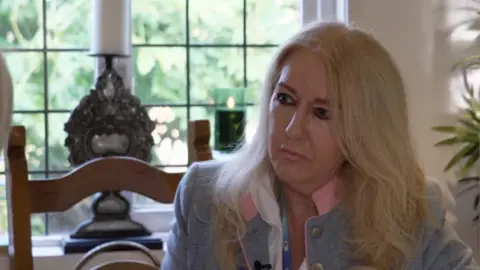Parental alienating behaviour 'endemic' - campaigner
 Getty Images
Getty ImagesA family safety campaigner has described the impact of parental alienating behaviours as a mental health "endemic".
Parental alienating behaviour is a term used to describe a parent who shows negative attitudes towards the other parent to undermine or destroy their relationship with the child.
New research published by the University of West London and funded by the campaign group Good Egg Safety, suggested about 40% of divorcees, or parents that were separated, said their ex-partner had attempted to turn their child against them.
Janis James, the CEO of Good Egg Safety, from Northampton, said action was needed to prevent "worsening outcomes for children".
"This is a massive public health issue, a legislative issue and a child protection issue," said Ms James.
"Children's commissioners have highlighted that one in five children and young people [in England aged eight to 25] have a probable mental health disorder, we're marching to an abyss in mental health."
Researchers at the University of West London described parental alienating behaviours as a type of abuse and said it led to an increased risk of the child developing post-traumatic stress disorder (PTSD), depression and suicidal thoughts.

Parents have told the BBC the legal process of trying to access their children through the courts had taken too long, in which time irreversible damage was caused to relationships.
Lisa, not her real name, from Bedfordshire, said her husband prevented her from seeing her boys two years ago following a divorce.
She said she had spent almost £50,000 fighting to have access to them through a family court.
"I was their main carer all of their lives. My youngest would say I was the best mummy in the world," she told the BBC.
"The default should be, when you separate, that unless there are any safeguarding concerns, which there aren't at all in my case, that there should be a 50/50 shared parenting agreement".
Shaun, not his real name, from Cambridgeshire said he had not seen his son for several years after he failed to get legal access.
He believed his former wife had turned his son against him.
"I remember really good times playing with him, rolling around in the grass and lots of warm cuddles," he said.
"Children are played through the system and made to say things that are maybe half truths that are turned into bigger deals - things that are untrue against the people they love".
Recognising signs
The University of West London study found children affected by parental alienating behaviour showed greater signs of "serious mental stress".
The study found that about a quarter of young adults sampled said they experienced more than 20 types of alienating behaviours from both parents during their childhoods.
Examples of parental alienating behaviour included a parent speaking negatively about another parent or misusing legal and social services to further isolate the targeted parent.
The study recommended "enhanced counselling for those families involved" to prevent and treat the behaviour.
Cafcass, a public body in England which advises family courts on the welfare of children, said alienating behaviours were often caused by a parent having unresolved anger towards their ex-partner, and a desire, "conscious or not", to punish them.
In a statement a Cafcass spokesperson said: "All practitioners receive mandatory training... including on how to assess a child who does not want to spend time with a parent.
"It is our job to understand what is happening for that child and what the possible explanations might be to advise the court about what is safe and in the child's best interests."
The Family Justice Council published guidance on how allegations of alienating behaviours are handled by family courts in December.
The report acknowledged that alienating behaviours were increasingly "exploited within family litigation" and shifted the focus away from the "voice of the child".
The guidance sought to increase "understanding, good practice, and ultimately good welfare outcomes for children".
The Judicial Office told the BBC it could not comment on individual cases.
Follow Northamptonshire news on BBC Sounds, Facebook, Instagram and X.
